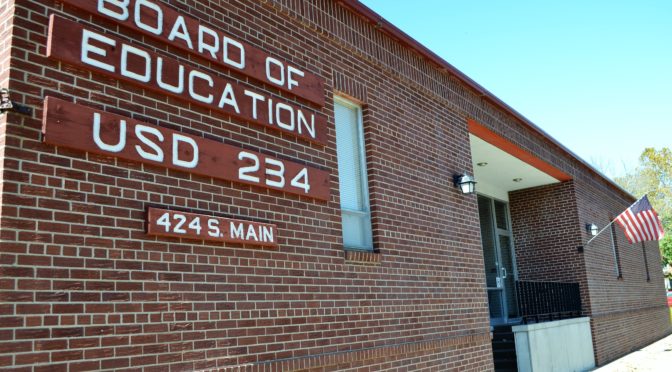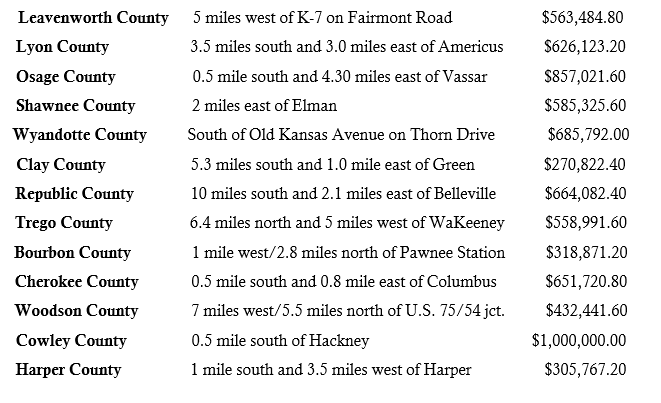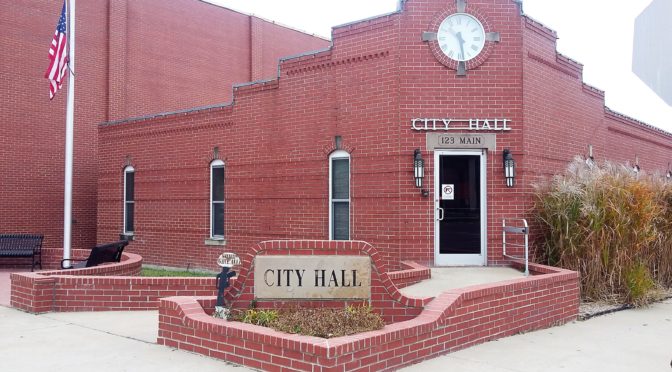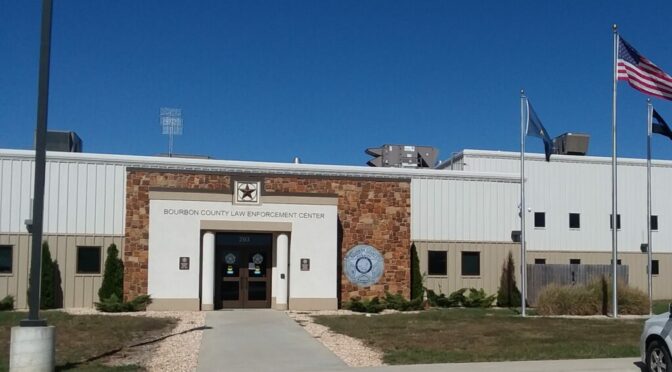September 14, 2021 Tuesday 9:00 am
The Bourbon County Commission met in open session with all three Commissioners and the County Deputy Clerk present.
Susan Bancroft, Ann Dare, Michael Hoyt, Robert Coon, and the sheriff’s department were also present.
Clifton made a motion to approve the previous meetings minutes, Jim seconded, all approved.
Jim made a motion to amend the agenda to discuss opening the commission room to the public, Clifton seconded, all approved.
Jim asked for Clifton for his opinion.
Clifton said that our numbers are down and everyone has had the chance to get the vaccine that wants it. He said that if people feel comfortable and want to come, they can and if they want to wear a mask, they can but they don’t have to.
Jim made a motion to open the Bourbon County commission meetings back up to the public, Clifton seconded and all approved.
Susan stated that there are four cemetery boards that are required to have revenue neutral rate hearings as well, they are on standby for questions. Their boards have already had hearings and adopted resolutions, but the county needs to formally adopt those resolutions. You will have to have four separate hearings to do it properly.
Clifton made a motion to amend the agenda to add revenue neutral rate hearings for four cemetery boards, Jim seconded and all approved
Lynne stated that the cemetery boards have been invited.
Susan stated that the first one is Barnesville Cemetery and they are going to increase the levy from 2.238 to 2.708.
Lynne stated that public comments are limited to five minutes each.
Michael Hoyt explained that it is an exercise to raise taxes because it is not that we are going to remain revenue neutral it is that we are not going to remain revenue neutral and we are going to collect a dollar more than we did in the previous year. He stated that just like the county is going to collect $42,000.00 more so it is a not revenue neutral rate.
Clifton stated that it is called a revenue neutral hearing and that they cannot change the name of it.
Michael stated that he was only trying to clarify what it is that we are allowing, that we are allowing the taxes to go up and they could go up even more.
Susan stated that they cannot levy more than what is approved.
Michael explained that Senate Bill 13 is to keep valuations from going up due to normal repairs.
Lynne stated that every year we set our mill levy and in our budget hearing we stated that we are raising the mill levy based on the increase in the assessed valuations. He also stated that all Senate Bill 13 does is require you to hold a hearing to be held and next year letters will be sent to every property owner in the state of Kansas if they go over the revenue neutral rate.
Susan stated that Barnesville levied for $2873 previously and are asking to increase to $3119.
Lynne made a motion to close the Barnesville budget hearing for revenue neutral, Jim seconded, all approved.
Clifton made a motion to open the revenue neutral rate hearing for Glendale Cemetery, Jim seconded, all approved
Susan stated that Glendale’s revenue neutral rate is 2.261 and the proposed tax rate is 3.150. Last year they levied for $2442 and this year they are asking for $2780.
Jim made a motion to close the Glendale budget hearing for revenue neutral, Clifton seconded, all approved.
Clifton made a motion to open the revenue neutral rate hearing for Lath Branch Cemetery, Jim seconded, all approved
Susan stated that revenue neutral rate is 0.954 and the proposed tax rate is 1.019. Last year they levied for $2557 and this year they are asking for $2755.
Jim made a motion to close the Lath Branch budget hearing for revenue neutral, Clifton seconded, all approved.
Clifton made a motion to open the revenue neutral rate hearing for Rosedale Cemetery, Jim seconded, all approved
Susan stated that Rosedale’s revenue neutral rate is 0.982 and the proposed tax rate is 1.443. Last year they levied for $5200 this year they are asking for $5500.
Jim made a motion to close the Rosedale’s budget hearing for revenue neutral, Clifton seconded, all approved.
Lynne stated that the resolutions all state the same thing for Barnesville Cemetery, Glendale Cemetery, Lth Branch Cemetery, and Rosedale Cemetery. Lynne said he would read one and then read the resolutions numbers for the others.
Lynne read the Barnesville resolution 01-2021 a resolution of the Barnesville Cemetery, Kansas to levy a property tax rate exceeding the revenue neutral rate; Clifton made a motion to adopt the resolution 01-2021, Jim seconded, all approved.
Lynne informed that the next resolution is for Glendale Cemetery and is the same as the previous resolution but with different rates, the resolution number for Glendale Cemetery is 01-21; Clifton made a motion to adopt resolution 01-21, Jim seconded, all approved.
Lynne informed that the next resolution is for Lath Branch Cemetery and is the same as the previous resolution but with different rates, the resolution number Lath Branch Cemetery number is 01-21; Clifton made a motion to adopt resolution 01-21, Jim seconded, all approved.
Lynne informed that the next resolution is for Rosedale Cemetery and is the same as the previous resolution but with different rates, the resolution number Rosedale Cemetery number is 01-21; Clifton made a motion to adopt resolution 01-21, Jim seconded, all approved.
Clifton made a motion to open the budget hearing for the 2022 Bourbon County budget, Jim seconded, all approved.
Susan stated that last year the county levied 64.931 this year we are levying 62.500 the revenue neutral rate is 62.130. The amount of property tax that the county levied for last year was $7,171,700.00 this year the amount of property tax levied this year is $7,127,242.00 which is $44,458.00 less than you levied last year because you were able to capture a little because the assessed value went up. Susan stated that last year the assessed valuation was 110 million and this year it is 114 million; the county cut the amount of property tax that was levied for by $44,458.00 but it is still above the revenue neutral rate.
Public Comment: Ann Dare asked what the combined total for all the cemeteries is? Susan stated she thought $4000. Clifton said it wasn’t that much it was more like $1100. Ann said that wasn’t very much she expected it to be more than that. Susan stated that their assessed valuation isn’t very high. Ann thanked the commissioners for working hard but she would like to some information on the school districts and where their money comes from, is it part of the 7 million? Lynne informed that there are several different separate taxing districts in the county and they have their own budgets and that they levy for in their district. Ann said there is a website that has a pie chart that sections off all the schools and city. Susan said that the city taxes just the city, the county taxes just the county but a school district has an area that is both in the city and the county that they tax on. Ann said then she would need to look at her tax statement to see what district that she is taxed on. She said that if the county and city work hard to decrease their budget but the school district goes way above their revenue neutral rate and budget then a person may not see any savings. Susan said yes it could be a wash. Ann advised to go to the school board meeting on September 20th at noon at the board of education office.
Michael Hoyt: How could the public comment when they weren’t allowed in the meetings for a month and a half and did not have the information to follow along at home. Last year during the work session documents were available. Lynne stated that Susan made the offer that the information was available to the public. Michael said he was not aware of that and if he cares enough to come to a meeting then he should be given the information to follow along without having to ask and last time he did not receive anything. Susan said that was not correct. Michael said that in a previous meeting that Commissioner Oharah caught an error on a page in the budget and Susan said it was right on the next page but no one watching the meetings could see what they were talking about. Also the two individuals that were brave enough to throw their hat is for the county clerk position didn’t even know that their salary was going down, that was sad to witness. Jim asked Michael if the commissioners are concerned with Covid and the number of people in the room should they have just canceled the meetings all together? Michael said no but he should have been able to come in here and get the documents. Clifton said that he was pretty sure that the offer was made for that information to available to the public. Susan said that it was in the detailed budget information that it was available in the clerk’s office. Michael said if he had that information then he would have known that it was available. Susan said that it was published in the paper. Michael expressed that it was said in the previous meeting that there were some discrepancies in the audit that the auditor would meet with the commissioners individually. Clifton said that that doesn’t have anything to do with the budget and would go in public comment. Michael asked how we could have a budget for next year if we don’t have confidence in last years. Susan said she was provided preliminary number in order to complete the audit. Michael asked if the federal audit has any effect on the budget? Susan said no and they are waiting on Terry Sercer for the completed audit.
Jim made a motion to close the 2022 Bourbon County budget hearing, Clifton seconded, all approved.
Eric stated that the sheriff’s department has a van that they are willing to donate to Road and Bridge. Bobby Reed stated that it is a 2009 white van that we had in our capital outlay that we were able to replace this year. It runs and drives and we are glad to donate to another county entity. We want approval from the commission to give them the van. The markings on the vehicle, identifying it as one our vehicles, would need to be removed. Lynne said that because it was already county property that they did not need a motion they could just give it to the other department.
Eric stated that he has culvert permits. Commissioners signed them. Kansas and 145th to the west has a bus stop ahead sign in that area. He spoke with the school and there is currently no school bus route in that area and asked permission to remove the sign. Jim made a motion for the sign to be removed, Clifton seconded and all approved.
Eric stated that he received a letter from the state for the landfill that they are now in compliance with the berms. As far as the beans go we are still out of compliance. We have until August 2022 to have those composted. Half have to be composted by April 1st. Had a meeting with John George, Ag Engineering, last week and he is working to get our permit so we can begin composting and receiving beans back at the landfill again.
Buying bridge inspections time for our bridges. Schwab Eaton has given us a proposal for 139 bridges. We have two fracture critical and they gave us a proposal to do our 30 low water structures that they may have done that for us before but it has been awhile. I make a recommendation that we have this done. There is a place on the form for you to sign if we want to move forward. Total cost is $20,951. Some are due in January, some in February and some in March. Jim made a motion to approve the inspections for bridges. Clifton seconded. All approved.
235th between Poplar and Quail we had a concrete box culvert give way last week. We replaced it the next day and have the road back open.
125th & Wagon, had some paperwork given to me last week, regarding the bridge. The northern 3 foot of it needed to be closed until repairs are made. The concrete guard rail was knocked over a while ago and it bent one of the supports underneath and caused quite a bit of damage. Went ahead and closed the 3 feet down. Still able to get a car or truck across but heavy equipment or farm machinery won’t be able to go through. The paperwork stated that we would have to have an engineer on site when we do the work. I have an engineer, Frank Young, that will be here next Wednesday and we will start repairing the bridge.
The Mac truck that you approved for us to look at and if we saw fit to purchase, it was in Fort Worth and Premier Truck Group took it upon themselves to help us out and brought the truck to Joplin. We’ll be going down late this afternoon or tomorrow. Provided the motor’s not knocking or the transmission has some big problem we’ll purchase the truck.
Windmills, there are four built in Bourbon County, seven in Crawford County. They ran into mother nature last week with the wind. It was too dangerous for their safety protocols and shut down. Was not able to use the top crane. Scheduled to start back up today weather permitting. Of the 70 sites in Bourbon and Crawford County they are completed with their excavation, rebar has been installed and concrete poured for all sites. They will be tearing down the concrete plant in the near future. Jim asked how many pieces are included in the tower. Eric stated 3.
Eric stated that Jim had asked about the cracked sealing. He has a call in to Pro sealing waiting to hear back from them. Jim stated he liked the idea of doing the work ourselves. Eric isn’t sure they will have the time to get to it so he is going to get a price and then we can make the decision once we get it.
Lynne Oharah asked about asphalt going south. Eric stated he hoped to be finished this week. He said they had 1.8 miles left, and are hoping to move on to 125th.
Justin Meeks stated that the discussion regarding the CIC contract would need to be delayed until next week. Our IT person has made phone calls to them and they have not been returned.
Justin also asked that the agenda be amended moving David Neville’s executive session to the end of the meeting. Clifton Beth made a motion to move Mr. Neville to the end of the meeting. Jim seconded. All approved.
Robert Coon talked about bail bondsmen responsibilities. Bourbon County has had some pretty bad people. The sheriff’s department is our first line of defense. I recently went to a CEU class and they had some good, astounding, information actually. Two-thirds of all felonies in the state of Kansas are drug related. Robert had a KBI report that he printed from the internet. Crime in Kansas is through the roof right now. I support our sheriff’s department. If you look up Taco Bell salaries you will see that some of them make those salaries out there. The world is changing, inflation is coming up and all of sudden these wages aren’t so high. Apparently our county is behind. What put me in a position to come talk about this is that I’ve gotten to know some of these deputies through my position. We had a deputy who left from here to go to another county for 3 to 4 dollars an hour more. Go for a ride with a deputy and see what goes on. We’ve got to keep our crime rate down and our community clean. I suggest you look at this jail thing again. I think you need a research team to look into housing inmates from other counties. According to Gov Kelly’s current numbers it would pay $492,000 for us to take 16 inmates at $75. per day for one year. Feeding them is $8.50/day, roughly $50,000 you are going to send down the way. It sounds like it could be a way to make more money and pay these guys. Would the county entertain a research team presenting their findings?
Clifton stated that we can’t stop anyone from doing research. Jim said he would encourage a study be done and bring it back to us. Clifton asked about if the jail would be full with people from Bourbon County. That would cost us more money. You have to look at all sides. Lynne stated the jail was supposed to be 6.85 million dollars when built and end up at 9.2 million. Robert stated that he asked how much more manpower it would take to house 16 additional inmates and he said he was told none.
Kevin Davidson, deputy, thanked the commissioners for the opportunity to speak. All deputies are here minus a couple. We take an oath to protect our community. We know that we are not going to get rich. Five years ago, Sheriff Martin did a survey and we were 26% below average. Sheriff Martin does another survey and we are now at 30% below the minimum pay for like counties. It’s concerning that there’s not a lot talk about it. 3% is .46/hour, $5.52 more per shift because we work 12 hour shifts, $44.16/pay period, that’s every two weeks, $1,148.16 more per year. Every little bit helps. A 30% increase to get us to the minimum of like counties would give us $11,000. more per year. That’s a big difference. Life-altering. I’ve been with the sheriff’s office for going on 8 years and have had 1 raise. The first three years my pay went down $800 due to insurance premiums. Kevin asked the commissioners if they knew of anyone that would work for that. Lynne Oharah said yes. EMTs do that. Kevin asked Lynne to put some of the “fire” that I heard in your voice regarding EMTs and put it toward the sheriff’s department. Lynne said he cares for all employees. Kevin continued stating that some deputy’s take home $600 and some $800 per pay. Not many people do that. We miss holidays, birthdays. We miss out on family time. Why? Because we care about Bourbon County. Our department doesn’t feel like we have your support. We feel like there is a rift between Sheriff Martin and Mr. Oharah. When Mr. Martin comes to speak, I’ve seen Mr. Oharah get his phone out just like this and I’ve seen Mr. Beth do it. If your phone is more important than what we are saying that speaks volumes. I demand your attention fully. Jim Harris said that he admires everything that department does. I believe your department deserves pay raises, but tell me what the solution is. You brought me a problem, tell me how to fix it. Kevin said he doesn’t have all the answers. My responsibility is to protect our county. Your part in this is figuring out the solutions. That’s why you were elected. Jim stated one of our choices is raising taxes. Bill Martin stated that several months ago there was a group that came up here, brokers, different consultants to give you ideas as what to do to save money. One group came up and said that within the first year they could save Bourbon County $100,000. Then after that for the next 5 to 7 years based on the information high risk $1.5 million saved. But when the time came to listen to the plans you guys didn’t give them an opportunity. You decided to stick with the same contract we’ve had for 3 additional years. Clifton stated that the group couldn’t guarantee the savings. Jim stated that any insurance company can make any kind of promise they want to. Susan Bancroft stated that Commissioner Oharah asked her to go back and look at the numbers from 2020 and based on not base pay, but total pay, based on deputies the average they get is $44,000/yr, if you include benefits that would be closer to $56,000/hr. If you take $56,000. and divide it by 2,080 hours, with overtime and straight time, they are right at the market average in this report. Jim stated that he supports the sheriff’s office. I agree they need more money, public works needs more money. I’m not willing to increase property tax and keep businesses from coming to Fort Scott because our taxes are too high. Trey Sharp said that he works over 100 hours per pay not because he wants to but because he has to. Lynne said maybe we need to look at cutting overtime and giving raises. Kevin stated that every time they get overtime they have to keep a running document of the overtime hours and why they worked overtime. He asked if any of the commissioners bothered to look at the overtime report and Lynne said they have never received it. Ben Cole stated they were provided to them a few years ago. Lynne stated that they do not receive them on a weekly basis. Susan Bancroft stated that to reduce overtime more staff will need to be added. The biggest question is where do we find the funds to give raises. Kevin stated there is no way in law enforcement that you can eliminate overtime. Jim Harris stated that he didn’t want to see the overtime sheets because he trusts him to do the right thing. Kevin stated that he wants the commissioners to see the overtime sheets so that they will understand. He said there is a silent evil in Bourbon County called narcotics. No one in this county knows that a week ago we assisted the DA in a task force combined with several agencies to help them intercept 6 lbs of meth headed for Bourbon County. Susan stated that to eliminate overtime more people have to be hired. Nick Trim stated he took a 57% cut to come here. The only way I can afford to do this is because of my previous pay from previous job. Jim asked Bill if he has been asked to meet with the commissioners regarding staffing. Bill stated that he has through budget hearings. Susan said that to be clear if additional staff is added, annual salaries will go down because additional staff will reduce overtime. If base pay is raised $2.00 per hour that would be $45,000 to $50,000 with taxes. Jim requested a work session with Bill and try to figure out staff and overtime. Kevin Davidson said there is a new position open at the Medical Building and wants to know what they are making. My understanding is they are making $21/hr. Susan clarified that it was $19.92/hr. Lynne said that is temporary as we are working on bringing in a new hospital and that position will go with the hospital. Kevin asked if they can understand how that would cause frustration? Kevin asked if he could get each commissioners word that they are going to get with Sheriff Martin and work together to figure out how to fix this. I realize nothing is going to happen overnight.
Lora Holdridge stated she wanted to say something. All you sheriff deputies work really hard and I know you put your life on the line for all of us, but you all chose that. Just like I told Road & Bridge, they work in the rain and snow. You all deserve a lot of money but so do a lot of us inside the courthouse that also hasn’t gotten raises. My deputy and I hardly ever get to take our days off because we only have two people. You can’t run my office with just two people. You guys are not the only ones out there that need help or a raise. You guys are asking them to commit to getting you up to speed. You guys put your life on the line and I am so thankful for that. But you guys make it sound like that you guys are the only ones who put your life on the line. I don’t know who is coming into my office and may get upset. You guys are putting it to the commissioners that you want something done for you and they need to do something for all of us. Bill I have nothing against you at all but you bring your whole department in here to talk about raises knowing budget time that didn’t look good. How often does your undersheriff go out on the road when they’re on vacation? Bill responded a lot. Ben doesn’t turn it in as overtime when he could because he’s trying to help the department and community. Lora asked considering overtime how much does your guys make an hour? Lynne stated $20/hr. Mr. Coon stated that overtime is not benefits. Quit acting like they’re getting paid a ton of money. Quit talking about it. Talk about base pay talk about what really matters.
Mr. Coon then asked Lora if she was an elected official. She said yes. He said she should be ashamed of herself for being in here discussing this. Lora said she doesn’t get any time off. Lora and Mr. Coon were then asked to take their discussion out of the room so that the commission meeting could continue.
Justin Meeks stated that Lora Holdridge’s executive session is actually on my time. I need to go in for that reason. I’ve got actually to help Mr. Hoyt to understand my position on this executive session. I do have one, two, three, four matters that are all attorney client privilege, possible litigation, HR issues that we have to address that have a huge legal background in them. Then, the other three parts are possible litigation. So, I could if you want go in for attorney client privilege for the issues of attorney client privilege and come back out and talk about possible litigation on an HR issue but I really think they are all the same. We learned in our training we can combine those if we clarify what they are. Lynne stated that if we are able to combine them to please do so to save time. Justin stated he would need twenty minutes. Clifton made the motion for executive session with all three commissioners and Justin Meeks. Justin stated there are incidents that have occurred that could lead to litigation and then an employee matter that could potentially lead to litigation returning at 11:28am. Jim seconded and all approved.
Clifton made a motion to resume normal session at 11:28am with action. Jim seconded all approved. I have Miss Holdridge in the room we would like to be able to work with Ashley and Miss Holdridge to petition the commission at a near future date to reopen a road. We have been working on this for about a year and a half. I did talk to Kansas Association of Counties about a month ago, our resolution is to reopen the road and at some point we would petition again to close it back down again. I am asking for permission from the commission to get this done. Clifton made a motion to allow County Counselor Meeks to work with Lora Holdridge and Ashley to future petition of road open/closure. Jim seconded all approved. Justin also asked for motion to allow him to work with Jim Harris and Eric Bailey on a issue with one of the roads with a right-of-way from a rail line on two separate roads. Clifton made a motion to allow Justin Meeks, Jim Harris and Eric Bailey to work on a couple of right-of-way areas in dealing with the railroad. Jim seconded all approved.
Justin stated that the publications for the tax sale will start on Saturday or possibly Wednesday of next week. Still projected to have a sale in October. We’ve had a lot of properties either sell or be redeemed so we are doing well in the collection part. This year the tax sale team is doing a great job. Probably will have 3 different sales next year.
Susan Bancroft had no comment.
Bill Martin provided a copy of the MOU for the School Resource Officer. The school board has signed and am asking for Mr. Oharah to sign. I’ll turn it over to Clerk’s office to be stamp filed and I will keep a copy of it. Clifton made a motion to allow Lynne Oharah to sign the MOU for USD 235 for the School Resources Officer. Jim seconded and all approved. Lynne Oharah signed the document. Bill asked for a phone conference with Susan Bancroft, himself and Austin Peters Group.
David Neville asked for a 5 minute executive session. Clifton made a motion for an executive session for non-elected personnel including all three commissioners, Justin Meeks, Susan Bancroft and Ashley Shelton and David Neville. Returning back to normal session at 11:45am. Normal session resumed with no action. Jim second all approved. David Neville wanted to discuss his wages. My current wages are $14.50/hr. A study was done 15 years ago stating that the maximum pay for myself should be over $15.00. I would like to request to be moved up to that. Lynne looked at current study that was done and the minimum wage should be $16.29. Lynne stated that the new study wasn’t apples to apples. David requested he would like to be brought up to at least the minimum of the new study. Clifton stated that they have been asked by multiple people today for raises and he is not willing to give one raise without looking at all of them. Lynne stated that the budget has 3% raise in it. Jim stated that he appreciated everything David does and that they would discuss and get back with them.
Jim Harris requested an executive session for non-elected personnel. Clifton seconded and all approved. Session includes all three commissioners and Justin Meeks. Normal session will resume at 12:05pm.
Clifton made a motion to resume normal session with no action. Jim seconded and all approved.
At 12:05pm, Jim made a motion to adjourn. Clifton seconded and all approved.
THE BOARD OF COMMISSIONERS
OF BOURBON COUNTY, KANSAS
___________________, Chairman
___________________, Commissioner
___________________, Commissioner
ATTEST:
Ashley Shelton, Bourbon County Deputy Clerk
_______________, Approved Date





 ###
###

